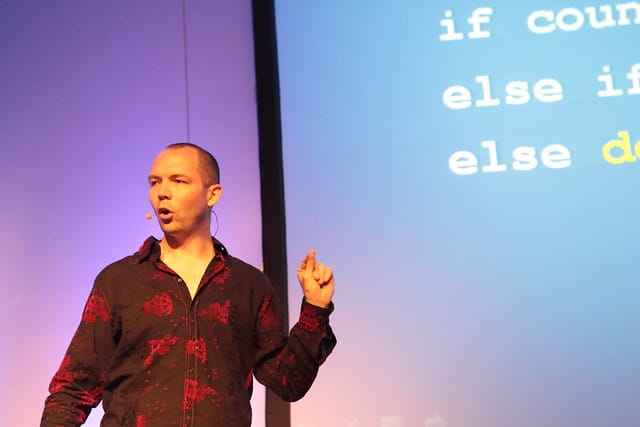
Game jams have become increasingly popular over the years, reaching an absurd new milestone earlier this year with the Molydeux Game Jam that took place in 28 different cities around the world this April. Game jams are especially inviting to people curious about making games but uncertain about how to get started. For experience programmers and designers like Jonathan Blow, creator of Braid and subject of a recent profile in The Atlantic, game jams are less purposeful.
Writing on the blog for his newest game The Witness, Blow described some thoughts on game jams:
I think these jams can be really nice for beginners, to show people that making a game is something within reach, and to help them meet other people interested in making games. For experienced developers, though, I think these jams are not so good, because the jams are part of an overall social context that supports stagnation.
Experienced developers would do well to continually hone their craft and push beyond their comfort zone, but jams celebrate low expectations and provide Warm Community Feelings that create a comfort coccoon. “You made a game that is not very interesting? You didn’t finish a game at all? Well, you are still part of a community that likes you because you are participating in a game jam, and that is what is truly important.”
Being an impassioned do’er and not just a complainer, Blow convened what he calls a “Depth Jam,” along with fellow designers Chris Hecker, Marc ten Bosch, and Daniel Benmergui. Blow explains:
We settled on the basic idea very quickly: the jam would occur in a relaxing retreat-like environment. There would be a limited number of participants; four seemed like a good number. Each participant would have a good game that he has already been working on for a while, and which presents some deep and interesting problem he would like to solve; this problem serves as a focus for discussion. The fact that every particpant has a game under discussion means that every participant has “skin in the game”, which keeps discussion tethered and unfrivolous.
I’d like to emphasize this last point because it can be subtle but it is crucial. Suppose some people are showing their games and being criticized and generally having a rough time due to all the stress that happens naturally when having one’s creation dissected; and meanwhile, the people who are criticizing do not have any obligations, and they are just tossing in comments from the peanut gallery. This situation creates a weird imbalance. The comments and criticism will not be as thoughtful as they could be, yet they will be taken very hard by the people showing the games.
If everyone is having their creations dissected, there’s only one class of attendee instead of two. It is easier to empathize and avoid unnecessary harshness. People are going to be more careful that their ideas and criticisms are thoughtful, because they are acutely aware of wanting careful input when it comes to their own game.
[via The Witness Blog] [img]




